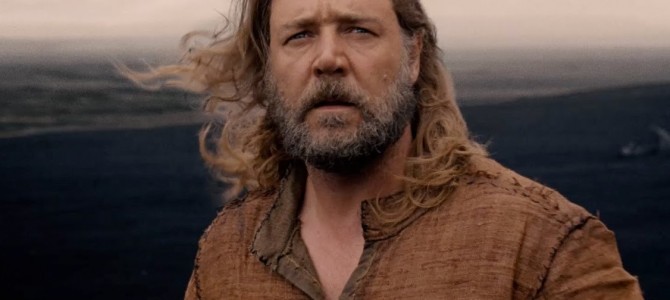
The reaction among Christians to Darren Aronofsky’s film treatment of the story of Noah has been thoroughly mixed, with opinions differing dramatically even between the devout. Some find it entirely worthwhile and maybe even an artistic work of genius. Others have received it with hostility and have treated it as though it deserves classification with Scorcese’s The Last Temptation of Christ. I have seen both films. My judgment is that the first group is more correct than the second.
The Scorcese film struck me as an attempt to play games with the Gospel. What if Christ wasn’t really without sin? What if Judas had been a conspirator with Jesus rather than a betrayer? What the great temptation by Satan had not been in the desert, but rather as Jesus died upon the cross? And what if the temptation had been to live the ordinary life of a man (not a worldly king) instead of the extraordinary life of a man-God martyr?
Aronofsky’s Noah does not fit in the genre of thought experiments conducted heedless of the feelings of the devout. Rather, I view it as an attempt to flesh out the narrative of one of the world’s most famous and enduring stories using both the Genesis account and the Book of Enoch, which is related to the Bible, though it is not canonical. This is not a what if so much as an attempt at a speculative what was.
Noah drove me straight to the text. I sat down and read through the relevant chapters in Genesis after watching the film. The exercise revealed that my previous readings of the Noah account were not thoughtful. I had a childhood template present in my mind at every other encounter. Having seen the film, I found myself able to read better and more deeply.
One of the key discoveries is that Cain does not simply disappear into nomadic wandering after killing his brother Abel. Rather, he goes on to have children. He establishes a family line. Tubal-cain, the great, great grandson of Cain, serves as the film’s primary antagonist. There he is in Genesis chapter 4. Aronofsky casts him as the king of a violent and industrial race of men. The scripture merely refers to him as a forger of bronze and iron implements. But put together his status as the descendant of Cain, his activity as a forger of metals, and God’s great displeasure with the men in the world, and it is not an incredible stretch to see Tubal-cain as Aronofsky portrays him. Tubal-cain wonders why God won’t speak to him and why he is under judgment. “I am like you,” he says to God in the film, which may be a tip of the storyteller’s hat toward original sin. He and his early industrial people live in blighted lands which appear to be ruined because of their bad stewardship, but may also be a result of God having cursed the ground in Genesis 3. The earth outside the lands of Noah and his kin is blackened and burnt.
In the same chapter Adam again becomes a father. He begins a new line distinct from Cain’s. This new son is Seth. Noah will be born in this line about eight generations later. Aronofsky highlights the difference between the two families. The men of Cain have spread over the earth living lives of violence and exploiting the creation. Seth’s line is different. In the film, they clearly live apart from Cain’s descendants and live more simply and respectfully. It is interesting to note that after Seth’s son Enosh is born, chapter 4 ends with the simple statement that “Then men began to call upon the name of the Lord.” It may be on the basis of this sentence and of Noah’s own favor with God that Aronofsky chooses to treat the Seth line as a people apart.
Genesis 5 contains a further geneology of Seth’s line. While Noah and his sons are the last before the flood, Enoch (who was taken by God before dying a natural death) and Methusaleh (who lived the longest life recorded in the Bible) are also part of this group that exists as a kind of plan B in place of Cain and his kin. Methusaleh, played by Anthony Hopkins, is Noah’s grandfather and an enigmatic presence. He has some unusual capabilities. One wonders if there is a theory at work suggesting that those closer in time to Adam are also closer to the glory of man in the Garden. Speaking of the Garden, one Christian reviewer complained about Adam and Eve looking like glow in the dark aliens. I think that’s too strong a statement. They glow, but they are still human in form and the glimpse of them is fleeting. Their brightness could be taken as a form of super-vitality or simply an indication of immortality. It is not a crazy thing to suggest that the pre-fall bodies may have been different in appearance from their post-fall counterparts.
Genesis 6 covers ground that is treated in the film in a way that is driving many Christian reviewers crazy with frustration and anger. How many complaints have you read that say something like “ROCK MONSTERS??? SERIOUSLY??? ROCK MONSTERS???” So, let’s try to work through that point. The film clearly tries to add detail to one of the most mystifying passages of scripture which appears in this chapter. “The Nephilim were on the earth in those days, and also afterward, when the sons of God came in to the daughters of men, and they bore children to them.” Who are these Nephilim? Are they angels? Aronofsky looks to the Book of Enoch (again, non-canonical) to explain. He pulls from there an account of angels who intercede after the fall of man. They teach men various arts regarding the manipulation of the creation. They also beget children with human women. God punishes them with binding and imprisonment. These severely chastened fallen angels take the form of the so-called rock monsters that have aroused so much ire. They are not really rock monsters so much as glorious beings weighted down with the stuff of earth as a dreadful sanction. In the film, one of these punished watchers sees a possibility of redemption in helping Noah. His peers eventually add their efforts to the cause. Recognizing that Aronofsky’s Noah is work of art rather than a straightforward representation of the Genesis account, one might be moved to appreciate the tragic plight of the watchers (they have fallen as men have fallen) and to hope for the same forgiveness for which they hope.
There is another matter covered in Genesis 6 that has stirred a great deal of controversy and I think more properly so. The Bible clearly states that the party of men headed for the ark includes Noah’s sons and their wives. Aronofsky tells the story with three brothers, but only one has a wife and she is barren. As a result, the group boarding the great boat has no future. At this point the director is not speculatively finding ways to fill out the narrative (as with Enoch’s Watchers), but instead warps the account to make his version of the story work. Noah concludes that God has sent him a clear message that he and his children will be the last people on the face of the earth. They will die and the sorry record of mankind will be finished. This turn in the tale is a pretty serious violation because it makes so much depend on something directly at odds with the Genesis account. Without this problem of the wives, much of the drama later in the story as Aronofsky tells it would be absent. Noah faces an Abraham/Isaac problem (one clearly contradicted by the text) when the barren women gives birth to twins.
It is true that God is so grieved with men as to consider wiping them out entirely. The seed of the notion is in Genesis 6. In Genesis 6:7 God says, “I will blot out man whom I have created from the face of the land . . .” It is after that thought in the next verse where mankind retains a hold on the future as the book reports, “But Noah found favor in the eyes of the Lord.”
God’s great complaint with men is that “the earth is filled with violence because of them.” Aronofsky presents the men outside the line of Seth as being brutal takers of what they want. Many have argued that the director twisted the Noah narrative to make some kind of ecological point related to climate change or something along those lines. I don’t think that is the case. When Noah goes out among men and witnesses their darkness, he sees things such as men selling girls and crowds tearing animals to pieces. What I see there is not so much a statement about ecology designed to awaken modern sensibilities, but a larger judgment about men failing to govern their own appetites and treating everything in creation, including each other, as means to their own poorly chosen ends.
There is much more that could be said about the film. It is very rich and stimulating. I think that what I am left with at the end goes back to Cain. After returning to the text, I very clearly see the separation of Adam’s descendants into sons of Cain and sons of Seth (in the place of Abel, who was wrongly slain). In his justice, God not only sends Cain away, but also brings an end to his line, utterly, in the flood. He is like a reverse Abraham. Noah, on the other hand, is Abraham before Abraham. He carries the hope for new beginnings on his shoulders.
Maybe here in the conclusion is a good time to address one final complaint from some of the reviewers. It is the case that the film’s Noah becomes exceedingly dark and brooding. He transforms from a wise and hopeful father into a dark figure indeed. When the ship finally lands, he becomes a passed out drunk rather than a happy castaway. But the film reminds the viewer, in a way the sanitized vacation Bible school version does not, that Noah is the handpicked survivor of a great disaster full of death and loss. Perhaps it is not too difficult to believe that Noah was as Aronofsky chooses to portray him, which is as a man who found favor with God both because of his righteousness and his empathy. There but for the grace of God, go I, he may have thought.
Hunter Baker, J.D., Ph.D. teaches political science at Union University and is the author of The End of Secularism and Political Thought: A Student’s Guide.








